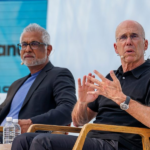Risher’s comments on Monday were the company’s first attempt to put a monetary figure on the savings—with Risher estimating the company would save some $200 million in insurance payments.
Uber and Lyft’s deal with the state regulators had come as a surprise to some, particularly because Uber, Lyft, and other companies had collectively spent some $200 million some years ago in an effort to push legislation that would classify ride-hail drivers as “independent contractors” and therefore limit the benefits they are able to receive in California.
During his interview on Monday, Risher pushed back against the idea that Lyft and drivers had different interests.
“I think people believe that drivers and Lyft are on the opposite side of things,” Risher said. “Often we’re not. Often when drivers make more money, Lyft makes more money. Lyft makes more money, drivers make more money. It’s inextricably linked.” He said that Lyft would pass down savings from the reduced insurance costs to its drivers.
After California’s deal with Uber and Lyft, other states have moved forward with similar attempts to allow workers to unionize. Massachusetts has also recently passed a ballot measure that would give drivers the right to organize, and Minnesota and Illinois are reportedly also considering the same.









